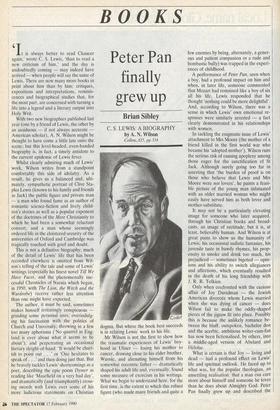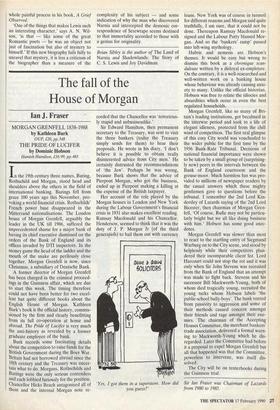BOOKS
Peter Pan finally
grew up
Brian Sibley
C. S. LEWIS: A BIOGRAPHY by A. N. Wilson
Collins, PS, pp.334
It is always better to read Chaucer again,' wrote C. S. Lewis, 'than to read a I new criticism of him,' and the day is undoubtedly coming — may indeed have arrived — when people will say the same of Lewis. There are now many more books in print about him than by him: critiques, expositions and interpretations, reminis- cences and biographical studies that, for the most part, are concerned with turning a life into a legend and a literary output into Holy Writ.
With two new biographies published last year (one by a friend of Lewis, the other by an assiduous — if not always accurate — American scholar), A. N. Wilson might be thought to have come a little late onto the scene; but this level-headed, even-handed biography is, in fact, a timely antidote to the current epidemic of Lewis fever.
Whilst clearly admiring much of Lewis' work, Wilson writes from a standpoint comfortably this side of idolatry. As a result, he gives us a balanced and, ulti- mately, sympathetic portrait of Clive Sta- ples Lewis (known to his family and friends as Jack) the public figure and private man — a man who found fame as an author of romantic science-fiction and lively child- ren's stories as well as a popular exponent of the doctrines of the Mere Christianity to which he had been a somewhat reluctant convert; and a man whose seemingly ordered life in the cloistered security of the universities of Oxford and Cambridge was tragically touched with grief and doubt.
This is not a definitive biography; much of the detail of Lewis' life that has been recorded elsewhere is omitted from Wil- son's telling of the tale and some of Lewis' writings (especially his finest novel Till We Have Faces, and the phenomenally suc- cessful Chronicles of Narnia which began, in 1950, with The Lion, the Witch and the Wardrobe) receive rather less attention than one might have expected.
The author, it must be said, sometimes makes himself irritatingly conspicuous — grinding some personal axes; overindulg- ing his fascination with the politics of Church and University; throwing in a few too many aphorisms ('No quarrel in Eng- land is ever about what it seems to be about'); and perpetrating an occasional literary sleight-of-hand: 'It would be churl- ish to point out . . .' or 'One hesitates to speak of. . .' and then doing just that. But he bravely tackles Lewis' shortcomings as a poet, describing the epic poem Dyiner as reading like •Masefield on a very had day', and dramatically (and triumphantly) cross- ing swords with Lewis over some of his more ludicrous statements on Christian dogma. But where the book best succeeds is in relating Lewis' work to his life. Mr Wilson is not the first to show how the traumatic experiences of Lewis' boy- hood in Ulster — losing his mother to cancer, drawing close to his elder brother, Warnie, and alienating himself from his somewhat eccentric father — dramatically shaped his adult life and, eventually, found some measure of exorcism in his writings. What we begin to understand here, for the first time, is the extent to which this robust figure (who made many friends and quite a few enemies by being, alternately, a gener- ous and patient companion or a rude and bombastic bully) was trapped in the experi- ences of childhood.
A performance of Peter Pan, seen when a boy, had a profound impact on him and when, in later life, someone commented that Mozart had remained like a boy of six all his life, Lewis responded that he thought 'nothing could be more delightful'. And, according to Wilson, there was a sense in which Lewis' own emotional re- sponses were similarly arrested — a fact clearly demonstrated in his relationships with women.
In tackling the enigmatic issue of Lewis' attachment to Mrs Moore (the mother of a friend killed in the first world war who became his `adopted mother'), Wilson runs the serious risk of causing apoplexy among those eager for the sanctification of St Jack. Although surely going too far in asserting that 'the burden of proof is on those who believe that Lewis and Mrs Moore were not lovers', he paints a feasi- ble picture of the young man infatuated with an older married woman who might easily have served him as both lover and mother-substitute.
It may not be a particularly elevating image for someone who later acquired, through his Christian books and broad- casts, an image of rectitude, but it is, at least, believably human. And Wilson is at great pains to show us the humanity of Lewis: his occasional sadistic fantasies, his juvenile taste in bawdy rhymes, his prop- ensity to smoke and drink too much, his prejudiced — sometimes bigoted — opin- ions and his ability to switch allegiances and affections, which eventually resulted in the death of his long friendship with J. R. R. Tolkien.
Only when confronted with the curious affair of Joy Davidman — the Jewish American divorcée whom Lewis married when she was dying of cancer — does Wilson fail to make the oddly-shaped pieces of the jigsaw fit into place. Possibly this is because the unlikely romance be- tween the bluff, outspoken, bachelor don and the acerbic, ambitious writer-cum-fan has now been fictionalised, by others, into a middle-aged version of Abelard and Heldise.
What is certain is that Joy — living and dead — had a profound effect on Lewis' life and spiritual outlook. He faced up to what was, for the popular theologian, an unsettling realisation: that a man can care more about himself and someone he loves than he does about Almighty God. Peter Pan finally grew up and described the whole painful process in his book, A Grief Observed.
'One of the things that makes Lewis such an interesting character,' says A. N. Wil- son, 'is that — like some of the great Romantic poets — he was an object not just of fascination but also of mystery to himself.' If this new biography fails fully to unravel that mystery, it is less a criticism of the biographer than a measure of the complexity of his subject — and some indication of why the man who discovered Narnia and intercepted the demonic cor- respondence of Screwtape seems destined to that immortality accorded to those with a genius for originality.
Brian Sibley is the author of The Land of Narnia and Shadowlands: The Story of C. S. Lewis and Joy Davidman.



















































 Previous page
Previous page